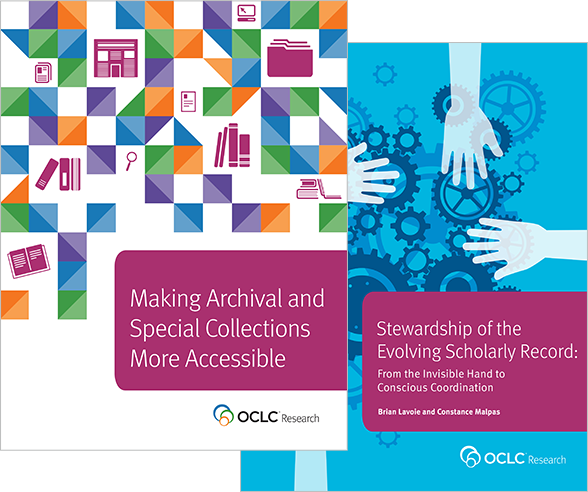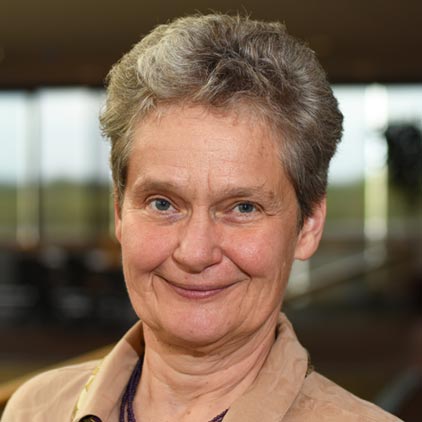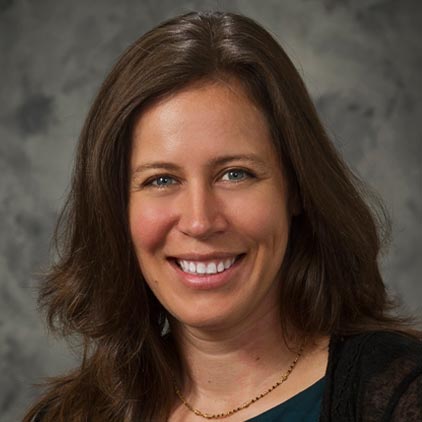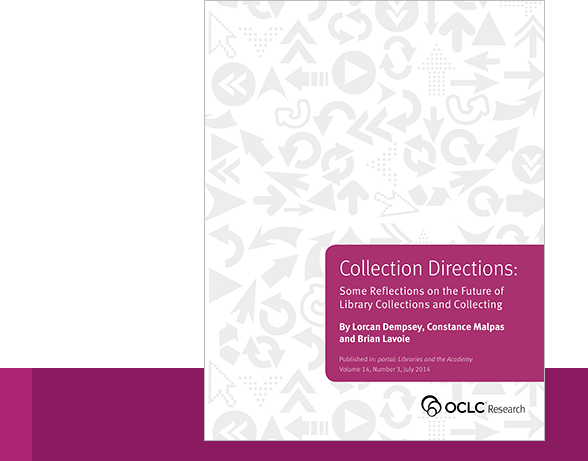Making breakthroughs together
Together we address today’s most prevalent library needs and chart a clear direction for the future.Share this on Twitter.
As a global library cooperative, we advance shared technology, expand our collective data and improve the visibility of libraries within the information environment. All with the purpose of furthering access to knowledge.
In FY2015, we made progress on all of those fronts. We helped libraries, partners and end users share knowledge with additions and enhancements to WorldCat. Our work on linked data helped provide more ways for libraries to connect users to library collections within their preferred workflows. WorldShare Management Services (WMS) continued to deliver value to libraries, helping them save time on back-office tasks so that they can focus on better serving their users and communities. And our ongoing shared print initiatives enabled libraries to transform spaces from book-heavy shelves into...whatever they could imagine.

Sharing knowledge
with WorldCat
OCLC member libraries cooperatively produce and maintain WorldCat, the most comprehensive global network of data about library collections and services.Share this on Twitter.
WorldCat data supports a range of OCLC and partner services, enabling seamless day-to-day operations, delivering on end-user needs and increasing the visibility of libraries on the Web.
In FY2015, WorldCat records and holdings continued to grow as OCLC member libraries, The Library of Congress, other national libraries and vendors/publishers from around the world contributed new electronic and print titles. And members continued their 40-year commitment to community-based maintenance, voluntarily improving nearly 1.2 million records.
Holdings
2,280,255,804
total
147,250,428
new in FY2015
Records
341,982,507
total
20,392,482
new in FY2015
Digital records
43,290,529
total
2,522,871
new in FY2015
E-book records
14,156,671
total
324,407
new in FY2015
482 languages, 15 scripts
represented in WorldCat
61% Non-English |
39% English |
Top 25 Languages of WorldCat Records
| English | 131,940,014 |
| German | 44,505,353 |
| French | 31,271,420 |
| Spanish | 15,628,722 |
| Chinese | 10,999,748 |
| Japanese | 9,799,974 |
| Italian | 8,277,827 |
| Dutch | 5,851,479 |
| Russian | 4,597,743 |
| Latin | 4,479,047 |
| Polish | 4,164,170 |
| Danish | 3,196,157 |
| Portuguese | 2,586,393 |
| Swedish | 2,354,098 |
| Hebrew | 2,134,077 |
| Slovenian | 2,094,375 |
| Arabic | 1,665,341 |
| Czech | 1,537,656 |
| Hungarian | 991,785 |
| Catalan | 990,565 |
| Thai | 950,533 |
| Finnish | 893,105 |
| Korean | 628,127 |
| Indonesian | 606,717 |
| Turkish | 586,625 |
Scripts in WorldCat
| Arabic |
| Armenian |
| Bengali |
| Chinese |
| Cyrillic |
| Devanagari |
| Ethiopic |
| Greek |
| Hebrew |
| Japanese |
| Korean |
| Latin |
| Syriac |
| Tamil |
| Thai |
Increasing visibility
OCLC has agreements in place with more than 200 content partners who represent nearly 6,000 publishers to ensure discovery of libraries’ most critical resources. In FY2015, valuable e-content was added to WorldCat through 24 new agreements, including content from these publisher partners:





Identifying new paths
OCLC Research advanced WorldCat in FY2015 by studying the creation and curation of institutional research assets and outputs, including digitized special collections, research data and researcher profiles. Two new reports encouraged the development of new ways for libraries to build and provide new types of collections and distinctive services.
Making Archival and Special Collections More Accessible focuses on ways that libraries can create and deliver new value by improving how these materials are described, disclosed, discovered and delivered.
Stewardship of the Evolving Scholarly Record: From the Invisible Hand to Conscious Coordination describes the key features of future stewardship models adapted to the characteristics of a digital, networked scholarly record, and discusses some practical implementation implications.

WorldCat facilitates the sharing of knowledge across institutions, countries and technologies.
Connecting users
to library collections
OCLC’s commitment to linked data paves the way for a bibliographic infrastructure that will increase useful connections within and outside the library community.Share this on Twitter.
Linked data is a way of describing library collections using a vocabulary native to the Web. In FY2015, we continued our pioneering work with linked data to make it easier for information searchers to find library resources on the Web.
Positioning libraries for success
We are working with libraries to understand their workflow requirements as they begin to work with linked data. We are also working with the Library of Congress and the BIBFRAME community to evaluate pilot data and finalize the BIBFRAME standard. In addition, we are working with Schema.org to improve standards for publishing entity data on the Web.
Two documents in FY2015 detail our work in publishing linked data derived from traditional library metadata.
Library Linked Data in the Cloud: OCLC’s Experiments with New Models of Resource Description describes OCLC’s contributions to the transformation of the Internet from a Web of documents to a Web of data.
Common Ground: Exploring Compatibilities between the Linked Data Models of the Library of Congress and OCLC compares and contrasts the compatible linked data initiatives at both institutions.

“Reaching users means doing a better job of moving more and richer datasets into the linked data cloud—exposing library collections on the Web.”
These efforts support our goal of orienting OCLC services around the needs of library users.

Delivering value
with WMS
When librarians save time on repetitive, administrative tasks, they can spend more time in their communities helping people make personal, professional and educational breakthroughs.Share this on Twitter.
Building a community
“[WMS] allows us to manage e-books, journal subscriptions...patron-driven acquisition...all of those things really help us manage e-resources in a way that we didn’t before.”
Libraries’ move to the cloud with the WorldShare Platform and WorldShare Management Services (WMS) continues—and has accelerated. In FY2015, more than 100 libraries joined this cutting-edge community, including Scion, our first institution in New Zealand, and the American University of Sharjah, our first institution in the Middle East. At the end of FY2015, we had 350 libraries live, spanning five continents—Africa, Asia, Australia, Europe and North America.
Innovating together
“Our students define the future. [We] provide services and products 24 hours a day, 7 days a week, around the world, in courses, classrooms and MOOCs. All this can be achieved thanks to WorldShare Management Services from OCLC.”
New analytics tools rolled out this year—based on community input—provide a range of new functionality to help librarians better understand local activity and make data-driven decisions about collections, workflows and other key aspects of library operations. The result is everyone spends less time searching for answers and managing processes and more time engaging with users.
“We believe that the (WMS) deployment and integration with WorldCat will not only give us an effective operational system for our Knowledge Centre and the National Forestry Library, but it will also improve access to the material for our staff, our stakeholders, the broader international science community and forestry and wood processing sectors.”
Our strategy and commitment to cloud technology build on the library community’s 45-year history of innovation and cooperation as OCLC.
Transforming spaces
with shared print initiatives
Engaging with users in new, meaningful ways requires a change in focus on collections and spaces.Share this on Twitter.
As library collections continue to move from print to digital, spaces once used to house books are now dedicated to collaboration and research. But deciding how to shift these collections is a difficult task. WorldCat provides key data to help library groups and consortia make data-driven decisions about which titles to keep locally, which to discard and which are the best candidates for shared collections.
In FY2015, we acquired Sustainable Collection Services (SCS) to help members work together to accomplish their shared print objectives.

“As part of OCLC, SCS has direct access to WorldCat and all the data in it, allowing us to do faster and more sophisticated analysis for our library customers. This further supports our goal to help them make intelligent collection management decisions.”
VIVA, the Virtual Library of Virginia, worked with SCS to better understand the combined print collections of its member institutions by examining the holdings of 12 representative member libraries. Using the data to identify patterns of local strengths, widely held publishers, usage and overlap in print collections, VIVA not only determined shared print and deselection candidates but is building a coherent, ordered plan for proactively developing electronic collections. This meant that all of its member libraries can take advantage of deep, subject-specific collections in the group, identify key e-resource packages and create a strategy for future collaborative collection development based on data.

“We’re using the evidence-based results to identify critical consortial resources, drive negotiations with publishers and build our collection development strategy going forward.”
For several years, OCLC Research has been exploring the trend from locally owned to jointly managed print and digital library collections. Interest in shared print management among OCLC member libraries reflects a growing awareness that long-term preservation of the published record can be organized as a collective effort. OCLC and SCS have worked as strategic partners to help libraries manage print materials since 2011. This acquisition should substantially accelerate shared print efforts across our global library cooperative.


“We anticipate that a large part of existing print collections, distributed across many libraries, will move into coordinated or shared management within a few years.”
By bringing together the power of WorldCat, the innovative services of SCS and the thought leadership of OCLC Research, we can move quickly to build services to address this critical need for libraries.
Photo credits:
Cover: TU Delft Library
Inset: University of Texas Libraries
